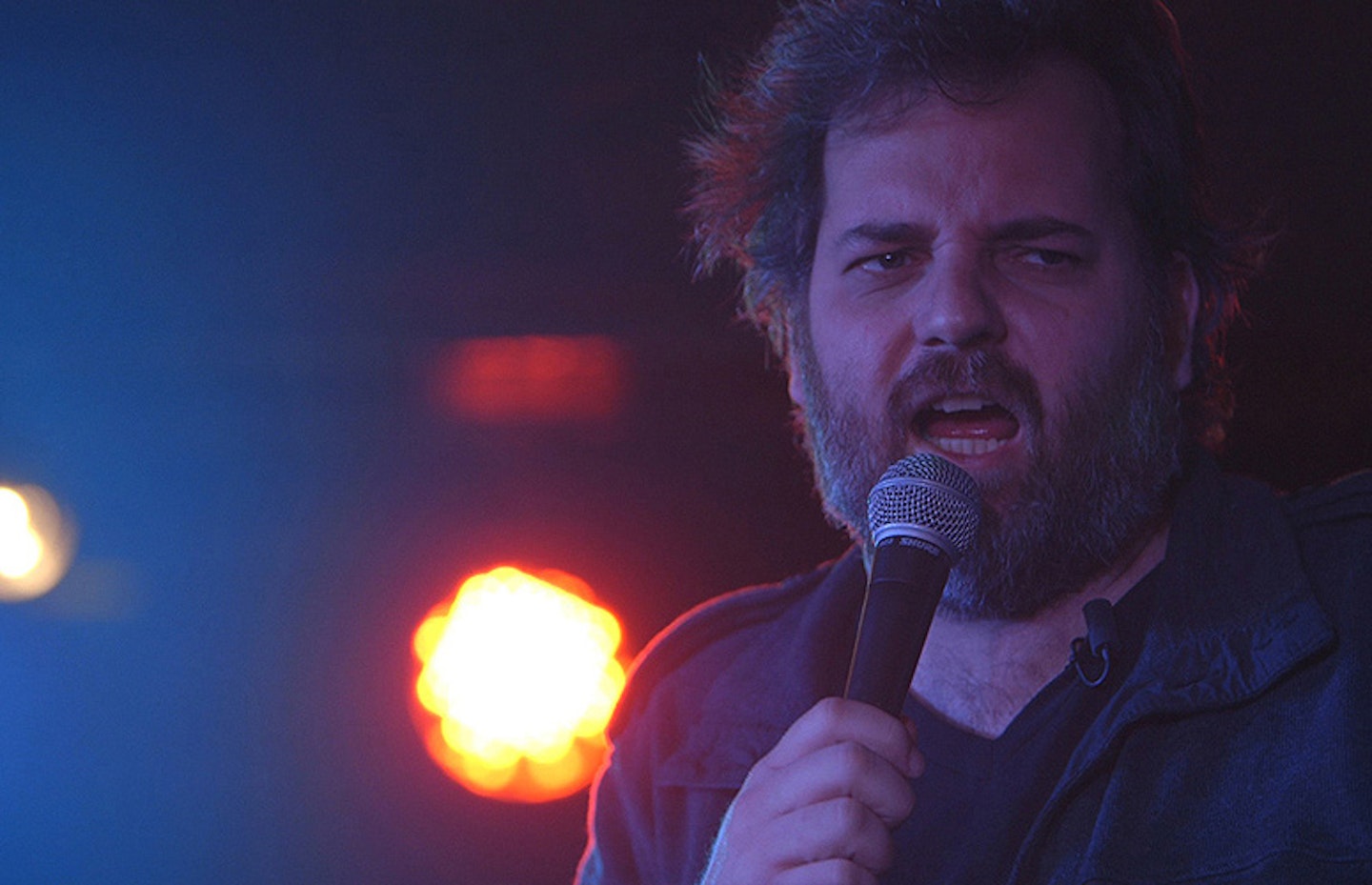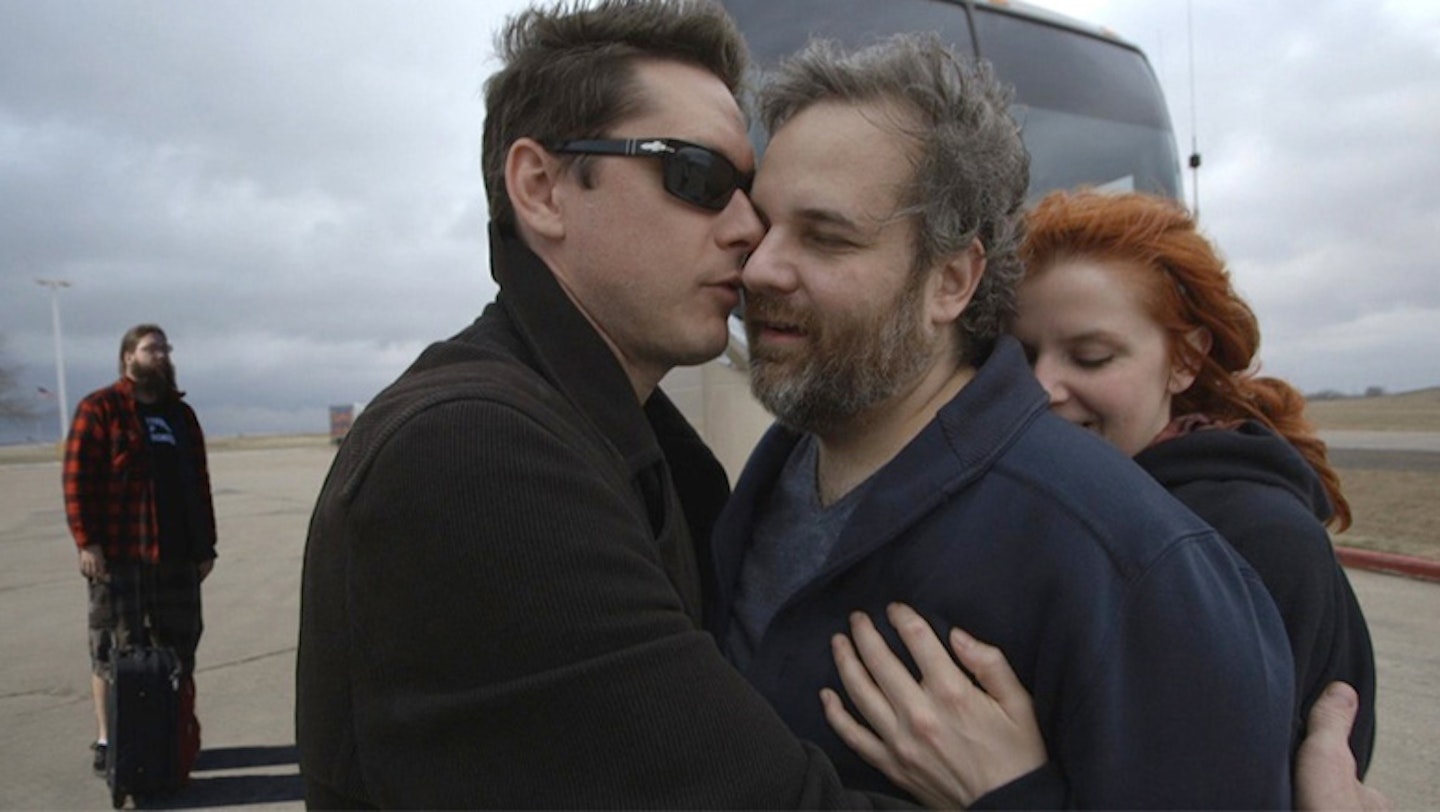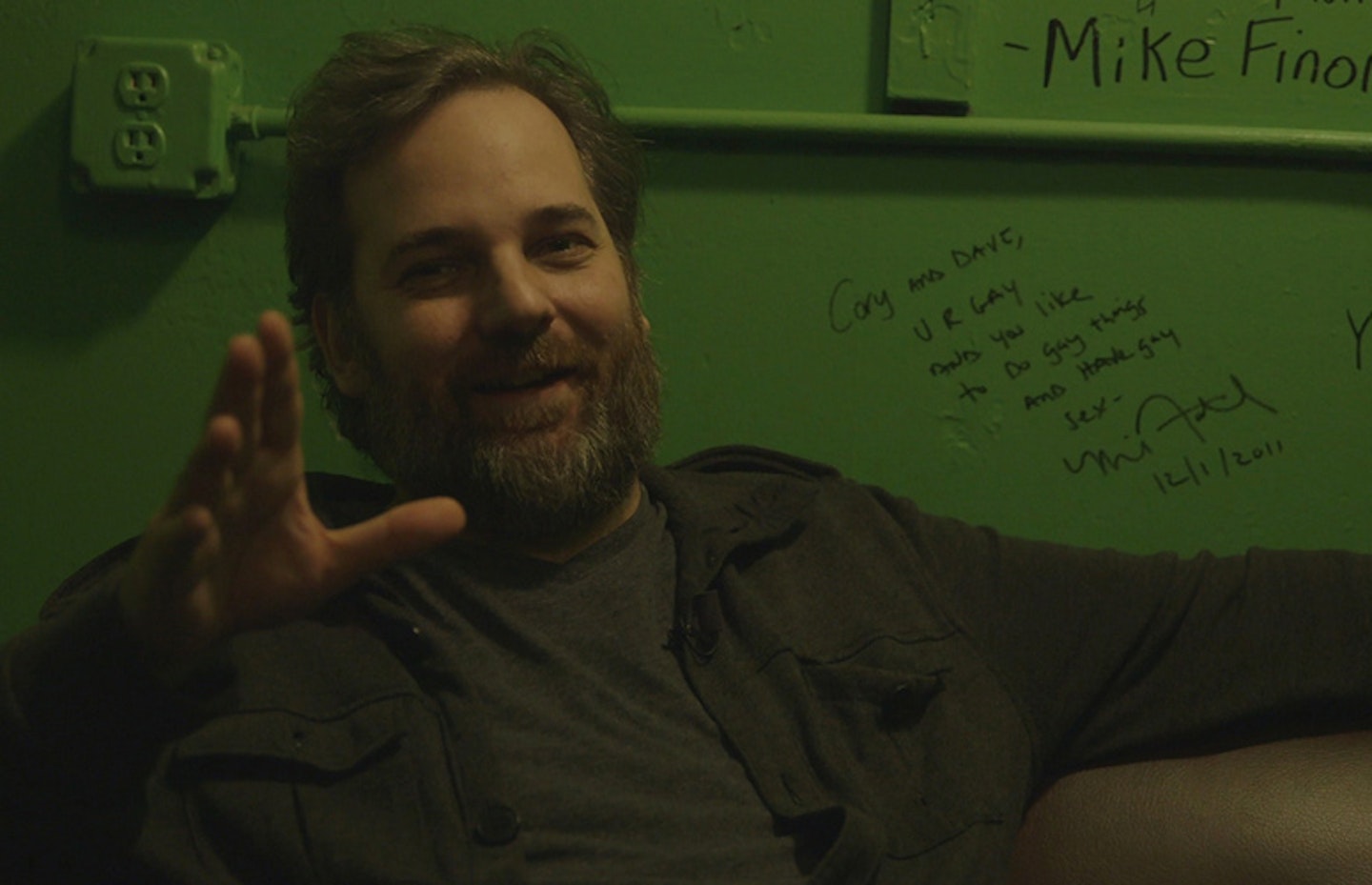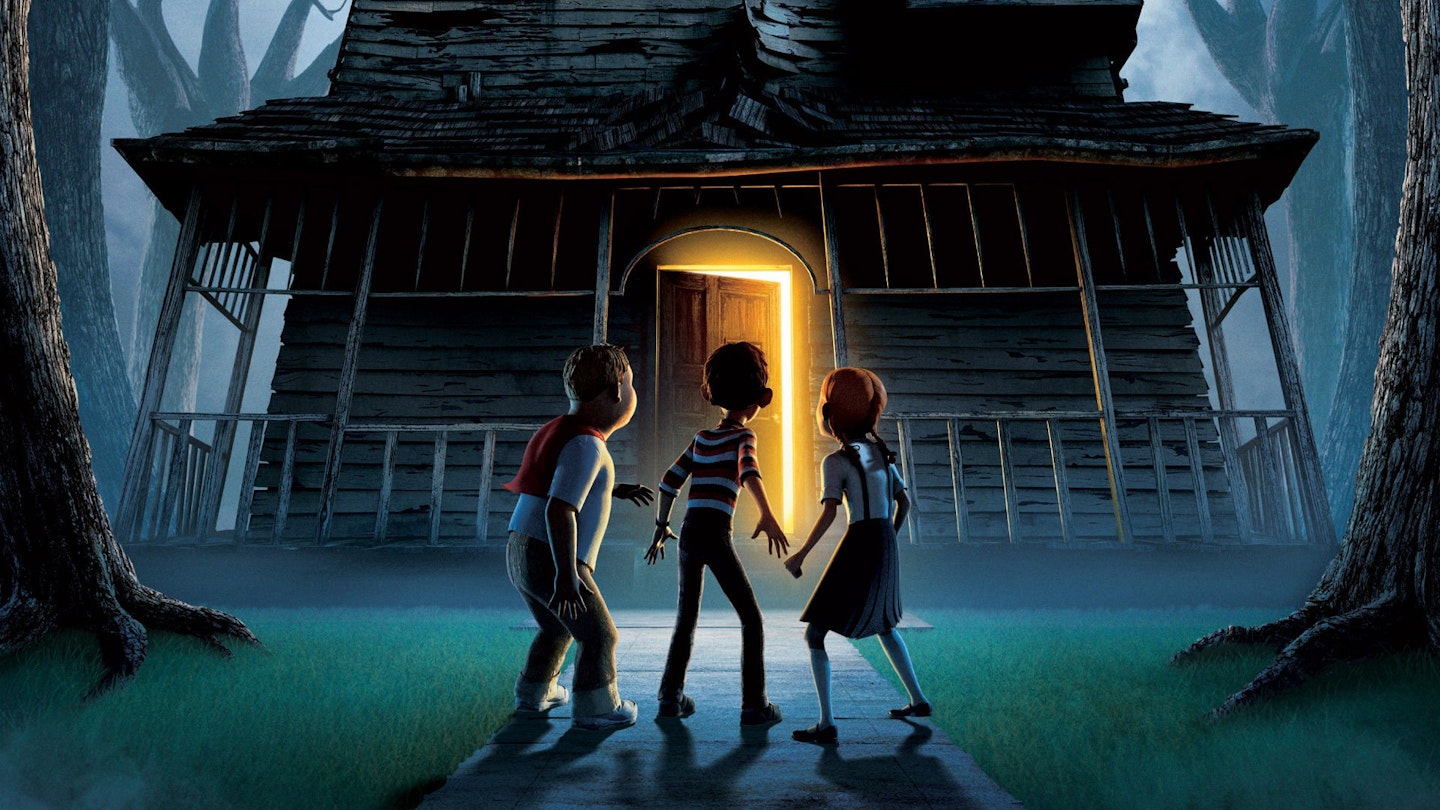If you Google Dan Harmon, amongst the suggestions that appear are “Dan Harmon Community,” “Dan Harmon Chevy Chase” and “Dan Harmon fired”. In its neat little way, the search engine thus sums up the three things for which the writer is best known: creating cult US comedy Community, having an enormous bust-up with cast member Chevy Chase (involving Harmon publicly playing an expletive-ridden voicemail from the actor) and getting fired from that very same show he created. It wasn’t always this way.

Dan Harmon isn’t a household name, but he’s a 41-year-old writer with a remarkable legacy: as well as Community, he co-wrote Monster House, co-created The Sarah Silverman Program, and in 2009 won an Emmy for Hugh Jackman’s opening number at the Oscars. But as Google attests, such glories aren’t the first things that spring to mind when Harmon’s name comes up. That’s already changing, though, and Google should probably do some catching up: last year, the writer was re-hired to Community (in what appeared to be an industry first), co-created with Justin Roiland the brilliantly inventive cartoon Rick And Morty for Adult Swim, and now is releasing a documentary, Harmontown, about… well, about him. How did this remarkable turnaround happen? And is the documentary anything more than just rampant egomania?
In the midst of his troubles with Community, Harmon turned to the stage, and to podcasting. With the help of comedian friend Jeff Davis, in 2011 he started Harmontown, a weekly show where he and Jeff thrash out Harmon’s problems and emotional hang-ups to a small, dedicated audience in the back of a comic book store. Thanks to their wit and intelligence, the entirely unplanned Harmontown quickly proved popular, and after turning it into a podcast – and Harmon finding himself fired – they decided to take it on a nationwide tour and film pretty much everything that happened. The man with the camera was director Neil Berkeley, who previously made the documentary Beauty Is Embarrassing, and after a year of editing, the final product premiered this month at SXSW.
A documentary about a podcast tour may sound like a smaller, nerdier incarnation of This Is Spinal Tap, but the reality is anything but. Harmon is possibly one of the most self-aware people on the planet, constantly analysing and re-analysing his behaviour. As such, he spends much of the film commenting on its structure: who might be the hero of the tour, the false conceits of filming (when he gets into the car, the camera's already inside, and he jokes that they must have been waiting in his car all night), and his biggest obsession, story structure. Even to those who've never heard of him or Community, Harmon is undoubtedly a fascinating, contradictory character, filled with wit, melancholy and a lot of alcohol.
At his best, he is the sharpest, funniest person in the room, exposing his own sexual predilections or childhood embarrassments without compunctions. At his worst, he’s a sociopathic autocrat, almost taking pleasure in the emotional turmoil he leaves in his wake. At the heart of the documentary is an enormous fight that takes place partly onstage between Dan and his girlfriend (now fiancée) Erin McGathy. She’s visibly close to tears the entire time, relating how Dan called her “a c-word”, while Harmon himself is busy cracking jokes and trying to make the audience laugh. It’s uncomfortable, to say the least. As Harmon related to Rolling Stone, “She’s not thrilled with it… It’s not an accurate portrayal of our relationship, but it’s a fair and accurate movie about what a piece of shit I am.”
 Harmon is filled with wit, melancholy and a lot of alcohol
Harmon is filled with wit, melancholy and a lot of alcohol
 Strangely, though, the heart of the documentary isn't Harmon, but his acolytes: as the tour races around America, director Neil Berkeley turns to the fans repeatedly to examine just what compels them to gather around the flame of Harmontown. As Berkeley explains, “I didn’t know a lot about Dan, to be honest, when I started, and he’s definitely a daunting character. He’s got a lot going on and we show it all in the movie. But beyond that, I would go there and talk to these kids that go to that show, and I just really sort of fell in love with the people.” As such, while celebrities like Jack Black and John Oliver do appear, Berkeley didn’t limit himself to these interviews. Instead, he embraced the fandom, interviewing around 130 Harmon fans (or “Harmenians”) over the course of the tour’s 23 shows.
Strangely, though, the heart of the documentary isn't Harmon, but his acolytes: as the tour races around America, director Neil Berkeley turns to the fans repeatedly to examine just what compels them to gather around the flame of Harmontown. As Berkeley explains, “I didn’t know a lot about Dan, to be honest, when I started, and he’s definitely a daunting character. He’s got a lot going on and we show it all in the movie. But beyond that, I would go there and talk to these kids that go to that show, and I just really sort of fell in love with the people.” As such, while celebrities like Jack Black and John Oliver do appear, Berkeley didn’t limit himself to these interviews. Instead, he embraced the fandom, interviewing around 130 Harmon fans (or “Harmenians”) over the course of the tour’s 23 shows.
This is the kind of thing that could only happen on the internet, where Harmontown connects effortlessly with its ever growing fanbase. Listeners are committed, and audience members regularly come up onstage to shoot the breeze with their hero. Celebrity guests occasionally pop up (including Robin Williams, Eric Idle, Patton Oswalt and Mitch Hurwitz), and regular contributors include the aforementioned Erin McGathy and rising star Kumail Nanjiani – but the heart of the podcast and the reason for its success is its connection with listeners. It's a powerful demonstration that podcasts are something unique, connecting with audiences in different, often stronger ways than other media.
It’s this emotional connection, more than anything, that is at the heart of Harmontown, and why it matters. We’re all familiar with the countless TV shows that inspire fervent passion in viewers, from Firefly to Breaking Bad, and the internet has only fuelled their dedication: after all, Veronica Mars hits the big screen this year thanks entirely to fan-funding via Kickstarter. Still, there’s something unique about Harmontown and the way it illuminates the growing interactivity and communication between performers and audiences. Harmontown isn’t just documentary about a solipsistic, alcoholic TV writer touring the country in a bus – it is that, but it’s also a portrait of how that writer has affected people. At the start of the film, Harmon is amazed by this, remarking how, “I hugged people whose bodies were shaking because they were so excited to be hugged.” Later on, one fan succinctly sums up Harmon's appeal: “He makes us not feel alone.”
The film documents the burgeoning Harmenian community, and demonstrates how its fluid interactions became available only through the internet. Given Berkeley’s unfamiliarity with the podcast before signing on, it was in part this online uniqueness that attracted him to the project, and he has carried this through to the film’s release: “It’s a new world. You have to find a new creative way to get people interested… His fans are going to watch it on the internet.” In fact, not only will the documentary be released online, but it will be supplemented by a three hour director’s cut.

Far from being precious about his film, Berkeley is positively effusive about the potential for creation that this opens up: “There definitely will be what I think is going to be a very watchable extended cut. We’re also going to put every show up online, we’re going to show behind the scenes, deleted stuff – we’re going to have a website with hours and hours and hours of extra content. But I’m really excited about that three hour version, and I imagine at some point one of his fans is going to download it and make their own movie out of it… That’s who his fans are. They’re going to watch it on their phones, they’re going to grab it, they’re going to cut it up into a million pieces and make something else out of it. So I look forward to that.”
And it’s not just in its unusual release that Harmontown celebrates this interaction: as filming got underway, Berkeley was overjoyed to find a representative of fans in a man named Spencer Crittenden. In the early days of Harmontown, Jeff and Dan spontaneously decided that they wanted to play Dungeons & Dragons onstage, and asked if there was a Dungeon Master in the house. Spencer had brought his dice with him that evening, and raised his hand. With his enormous beard, unflappable monotone and dry wit, the Dungeon Master became a hit with everyone, and D&D became a regular feature at Harmontown.
 It's a fair and accurate movie about what a piece of shit I am. - Dan Harmon
It's a fair and accurate movie about what a piece of shit I am. - Dan Harmon
 As such, when Harmon floated the idea to Berkeley of taking Spencer with them on tour, the director had no doubts: “I said, ‘You have to. I brought some friends to the show who didn’t know who you [Harmon] are, what D&D is, and that was their favourite part of the show, they loved it.’ And I remember, I would send these tour notes back from the road, and I wrote one to the editor, and I said, ‘Hey, you’re going to be getting more footage of Spencer. Something’s going on with this guy. He’s going on a journey, this is going to be interesting.’ And so it was on the tour, we just kind of discovered him being himself and doing what he’s doing and being really fascinated by it. So we made it a point, every day there was a camera following Spencer and talking to Spencer and seeing what he’s up to.”
As such, when Harmon floated the idea to Berkeley of taking Spencer with them on tour, the director had no doubts: “I said, ‘You have to. I brought some friends to the show who didn’t know who you [Harmon] are, what D&D is, and that was their favourite part of the show, they loved it.’ And I remember, I would send these tour notes back from the road, and I wrote one to the editor, and I said, ‘Hey, you’re going to be getting more footage of Spencer. Something’s going on with this guy. He’s going on a journey, this is going to be interesting.’ And so it was on the tour, we just kind of discovered him being himself and doing what he’s doing and being really fascinated by it. So we made it a point, every day there was a camera following Spencer and talking to Spencer and seeing what he’s up to.”
When I catch up with Spencer himself, he’s immediately self-deprecating. Since the tour, he’s started working for Harmon full time and has appeared in Community – not to mention become one of the more famous Dungeon Masters in the D&D world. It's been a lot to contend with, and now he's appearing as a central character in a feature documentary. Is he nervous? “I haven't really thought of it too much. It's a lot to worry about, I don't know... I'm just like a lot of the other fans that are going to be watching it anyway, except I randomly got the opportunity to come and participate in this whole thing, which is really crazy. I hope my contribution is worth it, otherwise I'm worried about what the fans are going to think.”
The fact that he's nervous seems slightly surprising; in the film itself, he comes across as a stoic, almost zen-like figure. Was that an act for the cameras? “I definitely do try to seem unflappable, but a weird thing is that when I'm stressed, I just kind of physically shut down. I just look like someone who's not bothered, when I'm really bothered. But I was actually really comfortable around the cameras, in a way I never really would've expected.” This comfort shows onscreen, as Spencer's musings and wanderings offer the ideal counterpoint to Harmon's more Hollywood-esque solipsistic moments. To use a King Of Kong analogy, Spencer often seems to be the Steve Wiebe to Dan's Billy Mitchell.
In his reservedness, and with his very large beard, Spencer isn't exactly the person you'd picture being centre stage in most films or documentaries. Yet his presence is the film's strongest aspect, and gives the narrative real stakes – we see a very normal person being thrust into the cult limelight, and having to deal with a lot of intense attention. There's a moment early on where a girl first asks for his autograph, and you can see the surprise and delight in Spencer's reaction. After posing for a photo, she leaves, and the camera lingers to capture a private smile that briefly flashes across his face. Yet after a while, the attention starts to wear on him, and in New York he relates how his smiles soon became forced.

Looking back now, Spencer is ambivalent: “I'm an introverted person, and I think what people don't necessarily understand about introverts is that it's not like they hate social interaction, it's just that it really takes energy. It's like running: it's not that people hate running, it's just you can't run forever.” This is typical of the kind of considered, intelligent answer Spencer gives, and he goes on to offer an insight into the appeal of Harmontown: “It's always mutating and just being an organic creature... I think that's what makes it so interesting, because the audience is comfortable doing their weird stuff and Dan's comfortable doing his weird stuff, and then a lot of times those paths cross, and that makes for these weird, magical coincidences. Just the weird, crazy, awesome stuff that ends up happening without any planning at all – like literally, zero planning – is really just amazing, and it's something I don't think exists in many other podcasts.”
 Spencer's very authentic and genuine. I find him more and more fascinating. - Neil Berkeley
Spencer's very authentic and genuine. I find him more and more fascinating. - Neil Berkeley
 In fact, it’s largely down to Spencer that Harmontown avoids being just an ego-trip. You don’t have to care about who Harmon is or what he does – instead, Spencer provides a way in for audiences, and balances out Harmon’s unrelenting self-analysis with a more reserved, drier attitude. I ask Berkeley how he views Spencer: “He’s fascinating to me. He’s unflappable… He’s very authentic and very genuine. I find him more and more fascinating as I get to know him. He represents the fans. He’s the embodiment of those kids in that crowd in the movie.” In fact, not only does Spencer represent fans, but together with Harmon, he also provides the film’s main narrative thrust: “Their stories intertwine through the movie. They blend together. They’re the protagonist and the antagonist and they switch roles.”
In fact, it’s largely down to Spencer that Harmontown avoids being just an ego-trip. You don’t have to care about who Harmon is or what he does – instead, Spencer provides a way in for audiences, and balances out Harmon’s unrelenting self-analysis with a more reserved, drier attitude. I ask Berkeley how he views Spencer: “He’s fascinating to me. He’s unflappable… He’s very authentic and very genuine. I find him more and more fascinating as I get to know him. He represents the fans. He’s the embodiment of those kids in that crowd in the movie.” In fact, not only does Spencer represent fans, but together with Harmon, he also provides the film’s main narrative thrust: “Their stories intertwine through the movie. They blend together. They’re the protagonist and the antagonist and they switch roles.”
After all this talk of fans, though, won’t the film be a little limited in its appeal? Berkeley is sure it won’t: “We’ve shown it to a lot of people, and I’ve intentionally shown it to people who don’t know who Dan is, and it’s got a lot of very relatable topics. You know, Dan, even though he’s a rich, famous writer, he still procrastinates, he still has trouble in his relationships, he’s a very human person. He’s got a very blue collar side to him that I think, even if you don’t know him, you can empathise with and you can relate to. He’s got very normal problems that we all deal with. And just the whole point of Harmontown, you know: these outcasts and kids that were lonely and scared, that’s how he was when he was a kid. So he’s very relatable in that way.”
It's not just Dan though. The documentary starts and ends with him, but it also offers a very approachable introduction to a cult world, and paints a very compelling portrait of fame, fandom, and how we relate to each other. As David Foster Wallace once said of fiction, it's about being a fucking human being. It turns out, Dan Harmon needed to get fired from Community to find out what that word really meant.
